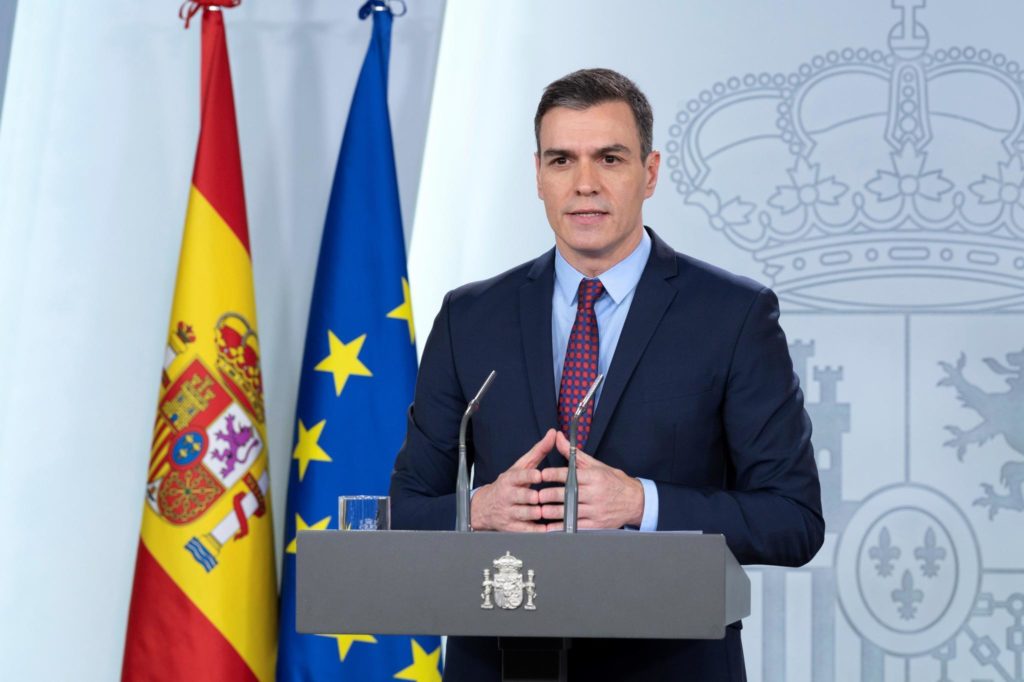Spain will reopen to overseas tourists from July, the prime minister has announced, pledging that the government will guarantee the safety of visitors and locals as the country emerges from one of Europe’s strictest coronavirus lockdowns.
Pedro Sánchez also said a €3bn (£2.7bn) minimum basic income scheme to help families most affected by the pandemic would come into effect in the next few weeks.
The prime minister was speaking after a “car demo” organised by the far-right Vox party brought thousands of people out to protest on Saturday over the government’s handling of the Covid-19 crisis.
Sánchez said: “As you know, Spain receives more than 80 million visitors a year. I am announcing that from July, Spain will reopen for foreign tourism in conditions of safety. Foreign tourists can also start planning their holidays in our country. Spain needs tourism, and tourism needs safety in both origin and destination. We will guarantee that tourists will not run any risks, nor will they bring any risk to our country.”
He said the central and regional governments had been planning and coordinating the return to tourism for weeks. “We’re sending everyone a message today: Spain will be waiting for you from July,” he said.
He called on Spaniards to begin planning domestic holidays, and he also announced that football leagues would be allowed to resume from 8 June.
He said a 10-day period of national mourning for the victims of the virus would begin on Tuesday.
To date, 28,628 people in Spain have died of coronavirus and 234,824 have been infected. The health crisis has also made socioeconomic problems worse. Unemployment rose by 300,000 in March and almost 283,000 in April.

Sánchez said the minimum basic income was part of the coalition government’s commitment to reducing poverty.
“It will cost around €3bn a year and will help four out of five people in severe poverty and benefit close to 850,000 households, half of which include children,” he said. “Neither the government nor Spanish society is going to look the other way while our compatriots queue up to eat, as we are sadly seeing now in some parts of the country.”
Sánchez confirmed that the government had not ruled out seeking a sixth two-week extension of the state of emergency, which has been in force since 14 March.
Vox’s protest filled some streets in Madrid and other cities with honking vehicles on Saturday morning. A cavalcade of hundreds of cars and motorcycles draped in Spanish flags joined the rally in Barcelona, demanding Sánchez’s resignation and chanting slogans against the government.
Sánchez said the minimum basic income was part of the coalition government’s commitment to reducing poverty.
“It will cost around €3bn a year and will help four out of five people in severe poverty and benefit close to 850,000 households, half of which include children,” he said. “Neither the government nor Spanish society is going to look the other way while our compatriots queue up to eat, as we are sadly seeing now in some parts of the country.”
Sánchez confirmed that the government had not ruled out seeking a sixth two-week extension of the state of emergency, which has been in force since 14 March.
Vox’s protest filled some streets in Madrid and other cities with honking vehicles on Saturday morning. A cavalcade of hundreds of cars and motorcycles draped in Spanish flags joined the rally in Barcelona, demanding Sánchez’s resignation and chanting slogans against the government.
Vox, the third largest party in the Spanish parliament, had urged people to get in their cars and create caravans of slow-moving vehicles. In order to limit possible infections, participants were told to stay in their cars and wear the mandatory face masks.
The party has accused Sánchez and his deputy prime minister, the Podemos leader Pablo Iglesias, of a draconian response to the pandemic that had resulted in “unemployment and misery”.
Photos and videos showed five senior members of Vox, including its leader, Santiago Abascal, standing next to each other on an open-top bus to lead the demonstration in Madrid.
Source: www.theguardian.com/







